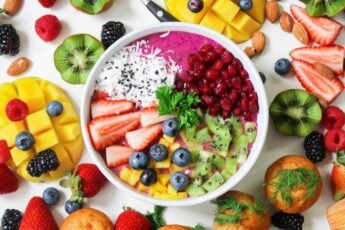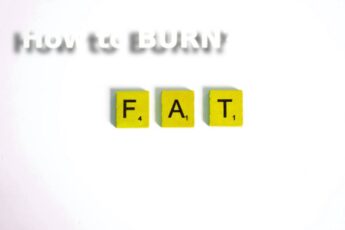Last Updated on November 19, 2023 by Local Trainer
Are you tired of all the conflicting diet advice out there? Do you find yourself wondering which diet myths are true and which are just plain old misconceptions? Well, look no further! In this article, we are going to bust the top 10 diet myths and reveal the truth behind them.
From the belief that skipping meals helps you lose weight faster to the notion that all fats are bad for you, we’ll debunk these myths one by one. Armed with science-backed facts, we’ll set the record straight and help you make more informed decisions about your diet.
But why should you trust us? Because we’ve done the research for you. As experienced health and nutrition writers, we’ve delved deep into the studies and consulted with experts to bring you the truth about these diet misconceptions.
So, get ready to challenge the diet dogma and arm yourself with knowledge. It’s time to debunk the myths and uncover the truth about what really works when it comes to maintaining a healthy diet. Let’s dive in!
Myth 1: Carbs are bad for you
Carbohydrates have gotten a bad rap in recent years, with many people believing that they are the enemy when it comes to weight loss and overall health. However, this is far from the truth. Carbohydrates are an essential macronutrient that provides our bodies with energy.
While it is true that not all carbs are created equal, it’s important to focus on the quality of carbohydrates rather than eliminating them completely. Whole grains, fruits, and vegetables are excellent sources of complex carbohydrates that are rich in fiber, vitamins, and minerals.
On the other hand, refined carbohydrates like white bread, white rice, and sugary snacks should be consumed in moderation as they lack the nutritional value of whole foods. The key is to choose carbohydrates that are nutrient-dense and provide sustained energy throughout the day. So, next time you hear someone say that carbs are bad for you, remember that it’s all about making smart choices.
Myth 2: You need to skip meals to lose weight
One of the most common misconceptions about weight loss is the belief that skipping meals can help you shed those extra pounds. However, this approach can actually be counterproductive.
When you skip a meal, your body goes into starvation mode, slowing down your metabolism and storing more fat as a survival mechanism. Additionally, skipping meals often leads to overeating later in the day, as you are more likely to feel ravenous and make unhealthy food choices.
Instead of skipping meals, focus on eating balanced and nutritious meals throughout the day. This will help keep your metabolism revved up and prevent excessive hunger. Remember, weight loss is about creating a calorie deficit, not depriving your body of essential nutrients.
Myth 3: Fat-free foods are always healthier
For years, fat has been demonized as the enemy of a healthy diet. As a result, fat-free or low-fat products flooded the market, promising a healthier alternative. However, the truth is that not all fats are created equal, and some are actually essential for our overall health.
While it’s true that saturated and trans fats should be limited in our diet, unsaturated fats, such as those found in avocados, nuts, and olive oil, are actually beneficial for our heart health. These fats help lower bad cholesterol levels and provide essential fatty acids that our bodies need to function properly.
When it comes to choosing the right fats, it’s about quality and moderation. Opt for foods that contain healthy fats and avoid processed products that often replace fat with unhealthy additives and excessive sugars.
Myth 4: All calories are created equal
The notion that all calories are equal and it doesn’t matter where they come from is a widespread misconception. While it’s true that weight loss ultimately comes down to creating a calorie deficit, the source of those calories can have a significant impact on our overall health.
Different foods have different effects on our body composition, metabolism, and satiety levels. For example, 100 calories from a sugary soda will have a vastly different impact on our bodies compared to 100 calories from a nutrient-dense salad.
Choosing whole, unprocessed foods that are rich in nutrients and fiber will not only help you feel fuller for longer but also provide your body with the essential vitamins and minerals it needs to thrive. So, when it comes to calories, quality matters just as much as quantity.
Myth 5: Detox diets are effective for weight loss
Detox diets have gained popularity in recent years as a quick fix for weight loss and overall health. However, the concept of detoxing is not scientifically supported and can actually be harmful to your body.
Our bodies have built-in detoxification systems, including the liver and kidneys, which work to eliminate toxins naturally. Drinking special juices or following restrictive diets can lead to nutrient deficiencies and disrupt the balance of your body’s natural detoxification processes.
Instead of relying on detox diets, focus on maintaining a balanced diet that includes a variety of fruits, vegetables, lean proteins, and whole grains. This will provide your body with the necessary nutrients to support its natural detoxification processes and promote overall health.
Myth 6: Eating late at night causes weight gain
You may have heard the advice to avoid eating late at night to prevent weight gain. While it’s true that late-night snacking can contribute to weight gain if you’re consuming excessive calories, the timing of your meals is not the sole determinant of weight management.
What matters more than the time you eat is what you eat and how much you eat. If you’re eating a balanced meal that fits within your daily calorie allowance, it’s unlikely that eating it later in the evening will lead to weight gain.
However, it’s important to listen to your body’s hunger and fullness cues. If you find yourself consistently overeating late at night or reaching for unhealthy snacks, it may be a sign that you need to reassess your eating habits and make healthier choices.
Myth 7: Eating small frequent meals boosts metabolism
The idea that eating small, frequent meals throughout the day can boost your metabolism and help you lose weight has been widely promoted. However, there is limited scientific evidence to support this claim.
While it’s true that eating frequent meals can help regulate blood sugar levels and prevent extreme hunger, the impact on metabolism is minimal. The total number of calories consumed throughout the day is what ultimately matters for weight management.
Instead of focusing on the frequency of your meals, prioritize the quality and composition of your diet. Aim for a balance of macronutrients, including lean proteins, complex carbohydrates, and healthy fats, and listen to your body’s natural hunger and fullness cues.
Myth 8: Supplements are necessary for a healthy diet
In today’s market, it’s easy to get overwhelmed by the abundance of dietary supplements claiming to be the key to optimal health. While certain supplements can be beneficial in specific cases, such as vitamin D for those with deficiencies, they are not a substitute for a healthy diet.
A well-balanced diet that includes a variety of whole foods should provide you with all the necessary nutrients your body needs. Instead of relying on supplements, focus on incorporating a wide range of fruits, vegetables, whole grains, lean proteins, and healthy fats into your daily meals.
If you have concerns about specific nutrient deficiencies, it’s best to consult with a healthcare professional who can guide you on the appropriate supplementation, if necessary. Remember, supplements should complement a healthy diet, not replace it.
Myth 9: Gluten-free diets are beneficial for everyone
Gluten-free diets have gained popularity in recent years, with many people believing that they are the key to improved health and weight loss. However, unless you have a diagnosed gluten intolerance or celiac disease, there is no scientific evidence to support the benefits of a gluten-free diet for the general population.
In fact, eliminating gluten from your diet unnecessarily can lead to nutrient deficiencies and a restricted food choices. Whole grains that contain gluten, such as wheat, barley, and rye, are rich in fiber, B vitamins, and minerals.
If you suspect you have a gluten intolerance or celiac disease, it’s important to consult with a healthcare professional and undergo proper testing. They can guide you on the appropriate dietary modifications and ensure you’re still receiving all the necessary nutrients.
Myth 10: Crash diets lead to long-term weight loss
Crash diets promise quick results by severely restricting your calorie intake. While you may see initial weight loss, crash diets are not sustainable in the long run and can have detrimental effects on your overall health.
Extreme calorie restriction can lead to nutrient deficiencies, muscle loss, and a slowed metabolism. Moreover, the weight lost on crash diets is often regained once normal eating patterns resume, leading to a cycle of yo-yo dieting.
Instead of resorting to crash diets, focus on making sustainable lifestyle changes that promote long-term weight loss and overall health. This includes adopting a balanced diet, incorporating regular physical activity, managing stress, and getting adequate sleep.
Conclusion
In a world filled with diet myths and misconceptions, it’s important to separate fact from fiction. By debunking these top 10 diet myths, we’ve shed light on the truth behind them and provided you with evidence-based information to make more informed decisions about your diet.
Remember, a healthy diet is not about following the latest fad or quick fix. It’s about nourishing your body with nutrient-dense foods, finding a balance that works for you, and enjoying a variety of flavors and textures.
So, the next time you come across a diet myth, question it, do your research, and consult with experts. Armed with knowledge, you can navigate the sea of diet advice and make choices that support your long-term health and well-being.
Local Trainer






